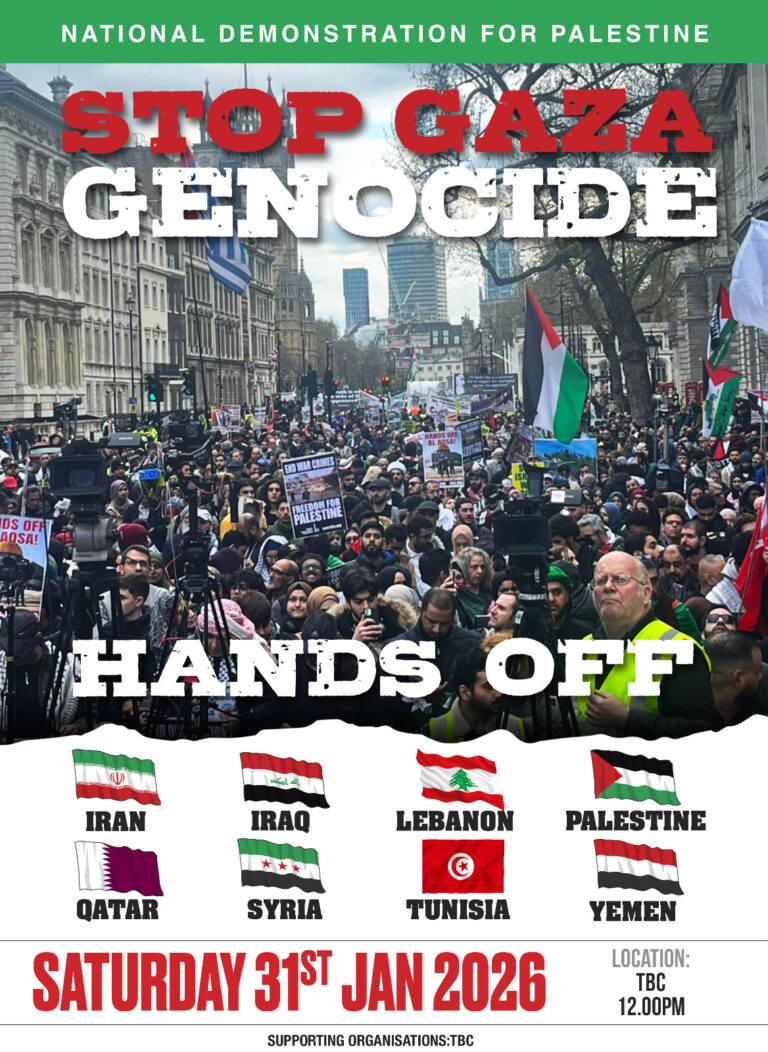Contents:
- Recent History of Anti-terror Legislation
- PREVENT: The emergence of a police state
- Counter Terrorism and Security Bill: The Consolidation of a Police State
The Counter Terrorism and Security Bill was placed before parliament in November 2014. The Bill will introduce a raft of new measures to deal with terrorism and extremism in the UK.
It is IHRC’s view that the current proposal is part of a long history of using legislation to target and criminalise the Muslim community. This new Bill is by far and away the most Orwellian to date; it will erode civil liberties and turn the UK into a police state.
Recent History of Anti-terror Legislation
Since the year 2000, the British government has introduced a series of draconian and far-reaching laws, designed ostensibly to counter a terrorist threat that is said to be substantially different in nature and scope to the threat it historically faced from its occupation of Northern Ireland.
The Terrorism Act 2000 was brought in principally to curtail the activities of opposition groups, mostly from the Muslim world, who had used the safe and conducive legal framework in Britain to campaign against oppressive regimes back home.
Following the September 11th 2001 attacks against the United States the British government announced a national state of emergency. This laid the ground for the introduction of the Anti-Terrorism, Crime and Security Act 2001, the centrepiece of which was the right of the state to detain without trial those suspected of terrorism.
In 2003, Parliament voted in the Extradition Act which gave the authorities the power to approve extradition requests from designated states for UK residents without the need for the receiving jurisdiction to provide any prima facie evidence. The Act has widely been employed to remove from the UK Muslim dissidents and activists whose presence the government deems to be undesirable.
After the right to hold suspects without trial, brought into force by the Anti-Terrorism, Crime and Security Act 2001, was struck down in 2004 by the House of Lords as incompatible with Britain’s obligations under the European Convention on Human Rights, Parliament wasted little time in replacing it with the Prevention of Terrorism Act 2005. Its main feature was that it replaced internment with control orders that allowed for restrictions to be imposed on the movements, associations and communications of terrorism suspects.
None of these legislative tools were successful in deterring the July 7th 2005 terrorist attacks on London commuters. In their aftermath Parliament rushed through the Terrorism Act 2006, which widened the definition of terrorism to include expressing support for the use of violence to achieve political objectives. Under its terms it was now illegal to call for the violent overthrow of an oppressive military dictatorship or to support an armed insurgency.
The Counter-Terrorism Act 2008 unsuccessfully attempted to extend the pre-charge detention period from 28 to 42 days. However the Act introduced more prohibitions including on the publication of material that could compromise the security of British security services and armed forces at home or abroad.
It was followed in 2010 by the Terrorist Asset-Freezing etc. Act which made it possible for the executive to designate as terrorist individuals or entities they “reasonably believe” to have been involved in terrorism. It does not require that the person or entity has been charged, convicted or even arrested for terrorist offences.[1]
The above is just an overview of the government’s legislative activities for the last 15 years. Alongside the laws, we have seen the government implement its PREVENT policy. This has been a controversial policy that has alienated many in the Muslim community, and now the government wishes to strengthen this programme with new powers and duties.
PREVENT: The emergence of a police state
After the 2005 London attacks, the government set up a Preventing Extremism Taskforce tasked with drawing up a strategy aimed, it was said, at winning the hearts and minds of Muslims by promoting a narrative that would counter extremist violence carried out in the name of Islam. Those discussions culminated in the birth of PREVENT, the so-called community engagement part of a four-pronged counter terrorism strategy which went by the title CONTEST.
PREVENT was predicated on the idea that British Muslim society lacked an effective counter narrative to ‘extremist’ ideological positions that were proving increasingly appealing to young Muslims affronted and angered by the effect on their co-religionists of western governments’ foreign policies, in particular the invasions of Afghanistan in 2001 and Iraq in 2003. Tapping into widespread British Muslim revulsion to the London attacks it claimed to seek to build a consensus around defeating the extremist narrative.
However what was originally conceived and sold by the government as a strategic partnership with other stakeholders – chief amongst the Muslim community – to counter terrorism has turned into an aggressive social engineering exercise to transform the attitudes of the law-abiding majority and gather information on them.
British Muslims, who were initially dubious about PREVENT but won over by promises that it would help expand their organisational capacity to deal with violent extremism in-house and largely on their own terms, soon discovered that the whole initiative was a state-led snooping campaign. Shami Chakrabarti, director of Liberty, branded it the biggest spying programme in Britain in modern times. PREVENT drew on voluntary sector organisations, community groups, educational institutions, local authorities, prisons, mosques and police forces to map the make-up and dynamics of British Muslim communities, often seeking information that had little to do with violent extremism or terrorism.
By 2011, following a government review into counter-terrorism strategy, it had also become clear that PREVENT would entail a more aggressive attitude towards changing opinions amongst British Muslims. Henceforth it would no longer be enough to use counter-narratives to challenge violent extremism – it was also expected that Muslims should also actively promote “core British values”, which according to the government, included conformity with its foreign policy objectives.[2]
The new proposals:
The new bill makes the following proposals:
1. Seizure of passports from persons suspected of involvement in terrorism – The Bill proposes granting powers to police and border officials to seize a person’s passport for up to 14 days (This can be extended upon application to a judge). The seizure applies to those coming into the UK as well as those leaving and affects UK citizens as well as non-UK nationals and is based on ‘suspicion’; the officer need not have any grounds or evidence for his suspicion.
2. Temporary exclusion orders – The Bill will empower the Home Secretary to issue a Temporary Exclusion Order, which will ban a UK citizen who is abroad from returning for up to 2 years, where she/he believes there is a “reasonable suspicion of involvement in terrorist activity abroad”. The Home Secretary may issue a permit for the individual to return, but the permit will impose conditions including where the person lives and what flight they take to return to the UK.
3. Introduction of new, tougher measures within Terrorism Prevention and Investigation Measures – TPIMs replaced Control Orders, which were used to restrict the activity of suspected terrorists who had not been convicted. When TPIMs were introduced in 2011 they decided they would scrap the powers to move people across the country. The Home Secretary now proposes bringing back the power to send suspects to new towns (up to 200 miles from their normal residence), introducing internal exile.
4. Creating an obligation to monitor and report extremism – Colleges, schools, prisons, GPs and councils will now have a legal duty to prevent people being drawn into terrorism. Schools, nurseries even GPs will be required to monitor those they provide services to and report anyone they believe is at risk of, or has in fact been drawn in to terrorism. Universities will have to draw up policies on extremist campus speakers, and prisons will be required to have policies for dealing with radicals. The Home Office will be able to get court orders obliging bodies to comply with their obligations.
5. “De-Radicalisation” Panels – The Bill creates a legal duty that will require local authorities to establish a panel to refer people identified as being at risk of ‘being drawn into terrorism’. The composition of that panel is set out in the Bill, and its purpose is to draw up a “de-radicalisation” plan for the person identified as being at risk. The Bill makes no provision for the person identified to have legal or other representation, or in the case of a child, to have a parent present.
6. Obligations on airlines – Airlines will now be required to disclose personal information about their passengers in advance. Airlines that refuse or fail to provide advance passenger lists will be banned from landing in Britain and may face a penalty.
The above is a summary of the main points contained within the Counter Terrorism Bill.
Counter Terrorism and Security Bill: The Consolidation of a Police State
There are many troubling aspects to these proposals. We now turn our attention to those aspects that IHRC feels are the greatest threats to our civil liberties:
1. The setting up of local panels to prepare a plan for those at risk of radicalisation is an obvious example of the UK moving towards policing peoples thoughts. Leaving aside the obvious criticisms that the identified individuals will have no way of making representations to the panel or even appealing the panel’s decision, it is staggering to think that the UK government believes it has the right to determine what others are allowed to think and believe, and impose “de-radicalisation” plans on those who disagree with the government’s notions of acceptable beliefs.
2. The obligation on teachers, GPs and other professionals to report those who they suspect of being at risk of being drawn into terrorism effectively incorporates them into the security apparatus. It will also mean that individuals will be monitored, on behalf of the state, starting from a young age at school / nursery[3] and continuing for the rest of their lives being watched by GPs, health workers and social workers. The powers will lead to a breakdown in trust between teachers / health workers on the one hand and students / patients on the other. This proposal does very little to combat radicalisation and will only create a police state in which people will feel they cannot trust the professionals in their lives because they are at risk of being reported.
3. The power to seize passports will, in the opinion of IHRC, lead to discrimination against Muslims and those perceived to be Muslim. Home Office data shows that Schedule 7 stop and search powers at airports have been disproportionately used against non-white communities.[4] The powers contained in the Bill to seize passports is similar to the Schedule 7 powers and we cannot see any safeguards to stop the new powers being abused like the Schedule 7 powers.
4. Temporary exclusion orders are a short sighted, knee-jerk reaction to ongoing conflicts abroad and throw up a number of practical and ethical problems. A terrorist determined to attack Britain will not be deterred by a ban and will seek alternative means to attack Britain and British interests. If a person poses a genuine risk surely it makes more sense to arrest and prosecute them. Temporary exclusion orders will effectively leave a person stateless. This can lead to a number of problems including being arrested and tortured.[5] Rather than having an effective policy to deal with those who pose a risk to the UK, the government has decided to abdicate its responsibilities. In doing so it will place British citizens at risk and will completely bypass safeguards or judicial oversight.[6]
This Bill is a continuation of the same tried and failed policies that have been pursued by successive governments since 2001.
The bill is yet another attempt by the government to erode our civil liberties and further demonise the Muslim community. Each time there is a terrorist act committed by a Muslim the moment is cynically exploited by politicians to widen the powers of the security services and further target and marginalise the Muslim community.
Studies and even a Parliamentary Report have concluded that the PREVENT regime of attempting to stop young Muslims from becoming radicalised is not working and is simply alienating Muslims in Britain by serving as a cover for intelligence gathering on the community. The programme is widely discredited and seeking to extend it further will likely only be counter-productive. PREVENT has not succeeded in staunching terrorism as the Commissioner of the Metropolitan Police, Sir Bernard Hogan-Howe, himself conceded when he said the number of ‘lone wolf’ attacks foiled in 2014 had gone up compared to previous years.
Statistics show that the application of existing anti-terrorism laws is discriminatory and disproportionately used against the Muslim community. For example Schedule 7 of the Terrorism Act which gives border officials the right to detain and question individuals they suspect of involvement in terrorism has in practice disproportionately targeted Muslims and ethnic minorities. And since 2001, some 70% of all arrests under terrorism legislation have been of non-whites. The existing legislation has effectively legitimised religious profiling of Muslims and created a social climate in which it is acceptable to treat them with suspicion and hostility. This Bill continues with this process.
[1] Extract from https://www.ihrc.org.uk/attachments/article/10904/TEUK%20Report-FV-FB.pdf Page 7
[2] Extract from https://www.ihrc.org.uk/attachments/article/10904/TEUK%20Report-FV-FB.pdf Page 8
[5] https://www.ihrc.org.uk/attachments/article/10983/IHRC’S%20BRIEFING-ImAct-02.pdf
[6] At the time of writing this the opposition have tabled an amendment calling for judicial oversight of Temporary Exclusion Orders http://www.theguardian.com/uk-news/2015/jan/05/nick-clegg-threatens-government-defeat-counterterrorism-bill





